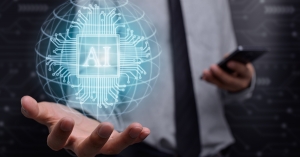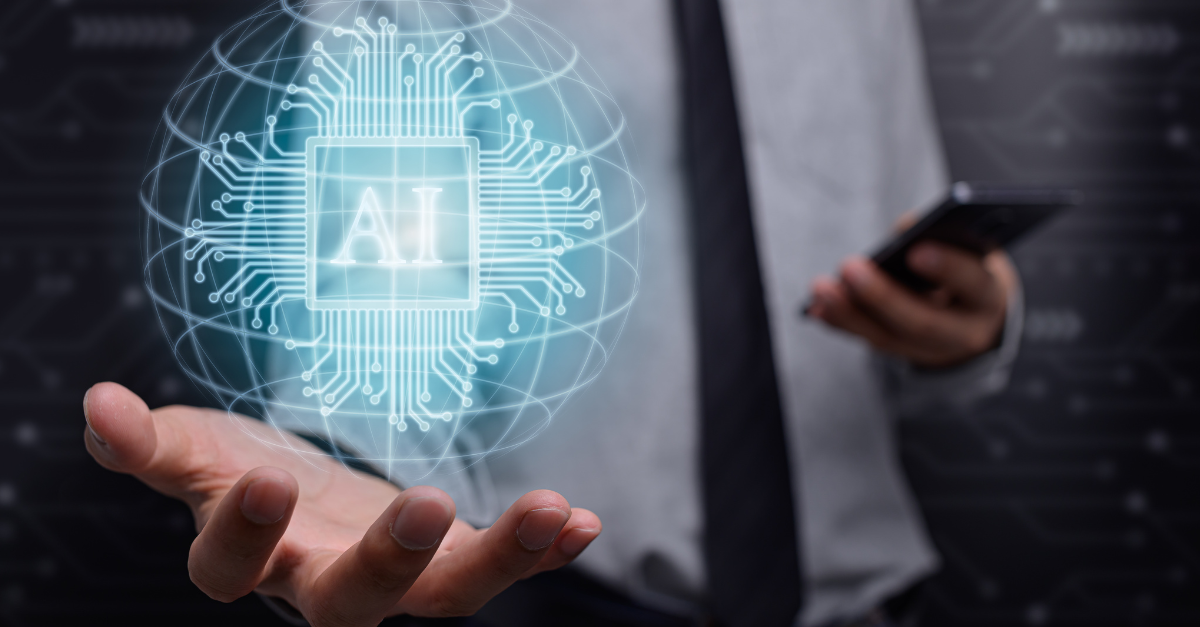The Impact Of AI On Recruitment
What is AI in Recruitment? The Fundamentals
Artificial intelligence, or “AI”, is a machine’s ability to perform cognitive functions similar to that of the human mind, such as perceiving, learning, and reasoning. There are many different types of artificial intelligence in the modern world and many sub-sections in the AI landscape.
For instance, machine learning (ML) systems can learn and adapt using data, without having to follow explicit instructions. Natural Language Processing (NLP) solutions can understand and categorise written and spoken language and respond to human commands.
In the tech recruitment landscape, various forms of AI can streamline and automate aspects of the recruitment process. AI can help recruiters source candidates, by rapidly searching through databases of information, and assist in analysing CVs and job applications.
Currently, 88% of companies worldwide are using AI in some form for the HR and recruitment process, and adoption is growing at a rapid pace.
Types of AI Tools in Recruitment
As new forms of AI emerge in the workplace the potential of AI in recruitment is evolving. While there are many different forms of AI available to tech recruiters, some of the most common types used in today’s landscape include:
• Screening software: Screening software, such as ATS (Applicant Tracking Systems) can assess CVs and look for candidates that match a position’s requirements. They can scan for keywords, specific skills, or tech certifications, and rank resumes based on relevance.
• Online interviewing tools: AI interviewing tools can help recruiters collect more data during a candidate interview. AI software can automatically analyse speech patterns, body language, and facial expressions, to tell teams more about a candidate’s behaviour.
• Outreach tools: Automated outreach tools allow businesses to send messages and information to numerous candidates at once. With one click, you can send out links, surveys, and job offers to a variety of candidates, or schedule an interview.
• Chatbots: 41% of companies now use chatbots as part of the recruitment process, to answer candidate questions, provide feedback on the interview process, or keep candidates informed about the progress of their application.
The Benefits of AI in Hiring and Recruitment
AI may still be in its early stages within the tech recruitment landscape, but it’s already demonstrating a host of potential benefits. Early adopters of AI-powered recruitment software say the technology has reduced their cost per screen by 75%, and their turnover by 35%
When used to support and augment recruitment teams, artificial intelligence can improve efficiency, performance, and productivity. The biggest benefits include:
Efficiency and Time Savings
Recruitment is a lengthy and time-consuming process, which often involves a lot of manual work. The recruitment role epitomises the concept of searching for a needle in a haystack. Sorting through candidates and screening resumes takes a lot of effort, with the average recruiter spending up to 30 hours per week on administrative tasks alone.
AI tools in the tech recruitment space can automate a number of repetitive tasks, saving crucial time. They can sort through thousands of resumes in an instant, and identify qualified candidates. Some tools can respond to candidate questions instantly, and even help schedule interviews based on shared calendar information.
This helps HR teams spend more of their time on strategic tasks, such as connecting with candidates, assessing cultural fit, and promoting an employer brand.
Improved Candidate Matching
The best tech recruiters are becoming increasingly data-driven. Rather than shortlisting candidates based on gut feeling, they analyse crucial information about each candidate, to determine a candidate’s capacity to thrive in a specific role.
AI solutions can assist with this process. They can process vast amounts of information, and help recruiters determine which candidates have the right skills, experience, and characteristics for a position. Screening tools can even rank candidates based on their proficiency for a role.
This also saves recruiters time comparing candidate resumes and creating shortlists for business leaders to assess. Some AI tools can even help tech recruiters choose candidates who are more likely to fit well into a company’s culture, reducing the risk of rapid turnover.
Diversity and Inclusion
Though recruiters and businesses are becoming more aware of the impact of bias in the hiring process, biases, and preconceptions can sometimes creep into the recruitment process. They can influence tech hiring decisions, prompting companies to prioritise/prioritize candidates based on factors that aren’t relevant, such as race, age, or gender.
79% of HR professionals admit that unconscious biases influence recruitment-related decisions. This results in poor hiring choices and can damage a company’s diversity.
When utilised correctly, AI tools can help to counteract bias reducing subjectivity in the hiring process.
AI can use standardised strategies to assess candidates based on the most relevant factors, such as skills and experience. It can eliminate subjective factors from the recruitment process, leading to a more diverse, and equitable hiring strategy.
The Drawbacks and Ethical Considerations
As valuable as AI can be in the recruitment strategy, it’s not without its issues. Though AI algorithms are becoming more advanced, they make mistakes. They can overlook important data, adopt the biases of the humans that train them, and even present privacy and security issues.
When using AI in the tech recruitment process, innovators need to be aware of:
Bias and Fairness
When used correctly, AI can help to reduce biases in the recruitment process. However, it’s also subject to bias itself. Bias in AI recruiting has become a major point of discussion in recent years, as AI systems are often influenced by the people who train and build them.
If the data fed to an AI solution is biased, the system itself becomes less objective. For instance, a technician might provide a screening tool with a set of resumes to train it on what features to look for in a candidate. If all of those resumes are for men, the AI tool would be more likely to look for male candidates when creating shortlists.
The issues with AI bias have created significant controversy over the years. Some candidates have even sued companies, saying that they were rejected from a role based on race, age, or disabilities.
Data Privacy
AI is powered by data. To create a powerful and effective AI system, tech leaders need to provide an algorithm with huge volumes of data to learn from. Unfortunately, this can lead to issues with data privacy regulations.
Companies might use personal candidate data to help train an AI system to look for specific information about future candidates. They may find systems hold or store information for too long, or use it in unethical ways.
To comply with data protection regulations, such as GDPR, businesses using AI in recruitment need to ensure they understand where data is stored, how it is used, and which data is processed by their technology. Many companies have yet to put proper data safeguards in place, which could lead to data breaches, fines, and reputational damage.
Transparency and Accountability
As AI is still a relatively new concept for many recruitment/search companies, it isn’t always easy to determine how and why certain systems make specific decisions. This has led to an increased focus from ethical AI regulators on “explain ability”. Experts in the tech recruitment/search companies need to be able to explain why their AI systems work in a specific way.
Even if an AI solution is responsible for screening and shortlisting candidates, the recruitment company is still accountable if something goes wrong. When working with AI solutions, recruiters and business leaders need to determine how transparent the AI decisions are, and what measures are being taken to mitigate bias.
This isn’t always simple for those who don’t have a deep existing knowledge of the AI landscape and how certain algorithms work.
The Human Element in AI-Enabled Hiring
Perhaps the biggest mistake companies make when implementing AI into the recruitment process is assuming that intelligent tools can completely eliminate the need for human experts. AI is a resource, capable of augmenting and supporting human beings.
The ideal AI-enabled hiring process will use intelligence to complement human expertise, not replace tech recruiters from the process.
Ultimately, in the world of talent acquisition, the human touch still plays a vital role in a successful recruitment process. While automation and AI can revolutionise various aspects of hiring, the importance of empathy and understanding provided by humans is paramount.
56% of candidates say they believe AI should never make hiring decisions without human input. After all, it’s the human experience and empathy of an expert recruiter that leads to more effective choices. Empathy allows recruiters to understand a candidate’s motivations, challenges, and unique circumstances, and deliver a more powerful candidate experience.
Because they empathise with candidates, tech recruiters can address their concerns throughout the hiring journey, tailor the experience to their needs, and provide relevant guidance. This leads to a stronger employer brand and deeper connections between employers and candidates.
Moreover, human interactions throughout the recruitment process address a candidate’s need for individualised support and personalised attention.
While technology can streamline aspects of the talent acquisition process, it lacks the nuanced understanding and emotional intelligence human beings possess. The personalised approach recruiters bring to the process helps candidates feel more connected to the organisation, increasing their chances of accepting job offers.
What’s more, it also enables recruiters to properly assess cultural fit, and the potential a tech candidate has for long-term success within a company.
The Future of AI in Recruiting and Hiring
While AI will never fully eliminate the need for human input during the recruitment process, innovations in the AI world are introducing new ways to augment and enhance hiring strategies. As mentioned previously, AI systems are now evolving at an incredible rate.
The rise of more advanced machine learning models and even generative AI is leading to new opportunities for tech recruiters to boost efficiency and productivity.
Emerging trends in the industry include:
• Voicebots: Evolutions in natural language processing and understanding are leading to the development of voicebots that can help screen candidates. They can rapidly capture information, respond to candidate questions, and capture data for recruitment teams.
• Interview scheduling: Modern AI solutions can help to improve the scheduling process. They can use calendar information and data about time zones to suggest potential interview times that work for both candidates and recruiters, reducing administrative work.
• AI video interviewing: Used in the video interview process, AI solutions can help recruiters identify desirable characteristics based on traits like a candidate’s pacing, eye contact, and body language. They can also help improve clarity, by transcribing spoken content.
• Gamified assessments: With AI, companies can create unique gamified assessments to help detect a candidate’s proficiency in certain areas. AI solutions can evaluate a candidate’s performance in certain areas and score their skills in a standardised format for recruiters.
As AI continues to evolve, it will undoubtedly streamline a number of tasks in the recruitment process, from sourcing candidates to assessing their skills. However, no matter how advanced this technology becomes, it will always be crucial to include human beings in any decision-making.
Preparing for an AI-Driven Future: Best Practices
Though there are still challenges to overcome in the world of AI recruitment, it seems likely that intelligent tools will play a greater role in the hiring process going forward.
Already, 92% of HR professionals believe AI is helping them to save time on administrative tasks.
However, companies planning on using AI will need to ensure they have the right strategy in place to avoid potential biases and issues.
When leveraging AI in the tech recruitment landscape, consider the following:
1. Focus on what AI Does Best
AI isn’t a catch-all solution for all recruitment issues. Different AI tools have different use cases, but fundamentally, the technology is most effective at managing and assessing data. AI shouldn’t be used to make decisions that require the ethical and empathetic input of a human being.
Instead, companies should use AI to empower and augment recruitment experts. This could mean automating repetitive tasks, like answering candidate questions or scanning through CVs for specific skills or keywords.
AI is fantastic at streamlining time-consuming, mundane tasks, such as scheduling interviews, identifying skills gaps among current employees, or assessing applicant materials. Human beings, on the other hand, are best at communication, empathetic assessment, and creativity.
2. Be Transparent
Transparency is crucial for any tech company using AI in the recruitment process. As new laws and regulations are introduced to govern the fair use of AI, companies will need to ensure they’re adhering to the laws in their countries.
A growing number of local governments now require companies to tell applicants when they’re using AI for hiring. Most of these laws also require recruiters to ask for consent from candidates if they’re going to use their data for training purposes.
Even if your business isn’t subject to certain AI laws yet, transparency can help to improve your employer brand and put candidates at ease. Reassuring candidates that they will maintain control over their data paves the foundations for a positive relationship, built on trust.
3. Maintain Hiring Etiquette When Using AI
One of the biggest complaints both candidates and recruiters have about AI is that it can dehumanise the hiring process. That’s why it’s so important to think about hiring etiquette throughout the recruitment journey.
It may be fine to use AI’s capabilities to reduce administrative tasks during the early stages of the tech recruitment process. For instance, you could use AI to rapidly respond to candidates and let them know you’ve received their application.
However, companies shouldn’t depend on AI to interact with candidates in the later stages of the hiring journey. Personalised and authentic communication with human beings is still essential to building strong relationships and positive candidate experiences.
4. Understand the Drawbacks and Limitations of AI
When used properly, AI can help with a lot of components in the recruitment process. It can help to remove bias when filtering through candidates, and streamline repetitive tasks. However, there are also dangers to relying on AI too much in your hiring strategy.
For instance, AI has been proven to exhibit bias in the past, as a result of the information engineers feed into the algorithms. It can exclude specific races or genders from the hiring process, simply because it hasn’t been exposed to enough data about different people.
Additionally, AI can store and use data in a way that’s considered unethical, or dangerous. With this in mind, tech companies must ensure they’re conducting frequent quality control tests, to measure the outcomes of using AI tools against their DEI goals.
5. Test and Readjust Regularly
AI is constantly evolving and changing. If your AI recruitment software fails to find candidates in the tech landscape that match your needs, it’s unlikely that the number of valuable candidates has suddenly dropped. Instead, there’s a good chance your AI solutions need adjustment, or an experienced recruiter is a better option because of their connections.
Even if you are finding excellent candidates with the help of AI tools, it’s worth conducting control tests at least a few times each year. Companies can perform human reviews of a randomised set of resumes for a recently filled role, to determine whether candidates are being missed out.
Human beings will be more able to identify important factors that contribute to the success of an employee in your business, such as cultural fit.
The Growing Impact of AI in Recruitment
It’s impossible to ignore the growing presence of artificial intelligence in the modern recruitment world. AI certainly has a number of benefits to offer tech recruiters and companies in search of top talent. It can streamline numerous administrative tasks and save teams significant time and effort in finding and connecting with candidates.
However, AI recruiting tools won’t remove the need for human recruiters. Effective talent acquisition relies on the experience, expertise, and empathy offered by human beings. Companies embracing AI for the future of recruitment need to remember these tools are only suitable for augmenting and supporting recruitment teams.
What’s more, it’s crucial for businesses to recognise the importance of using AI responsibly. There are various risks and dangers involved with relying too heavily on AI in the recruitment process. Business leaders and recruiters must ensure their use of AI doesn’t lead to bias, unethical practices, or issues with privacy and data security.
If you’re planning on using AI recruitment tools, start by improving your AI knowledge, learning as much as you can about the landscape, and building comprehensive strategies for success.
AI can be a powerful tool for tech hiring experts – but only when it’s used with care.
About Inspire People
We believe that technology has the power to change the world for the better and we love working with businesses whose technology or purpose has a positive impact. We help businesses that share our vision access the people, resources and strategic advice they need to achieve their digital transformation goals
Our service is designed to accelerate your digital growth. We created our offer in response to emerging challenges in an uncertain business landscape: a blend of Advisory, Talent and Project led services that will help you achieve your strategic aims and deliver more for your employees and customers. We’ll connect you to rare specialist talent, experts and insight to help you navigate your biggest challenges and remain competitive in a changed world.
Get in touch today to discover how working with us could help you innovate and grow.
Speak to our expert team on +44(0)20 7871 8550 or email hello@inspirepeople.net
Technology seems so entrenched in our modern lives that most of us don’t even give it a second thought, whether shopping online, catching up with friends via social media, or watching Netflix. Until, that is, people start talking about artificial intelligence (AI), robots taking over jobs, and what the future of work may look like. Particularly in a post COVID-19 world.
Just How Advanced is AI Anyway?
While advocates of AI are quick to expound on the benefits of AI and similar digital tools, others find the idea of robots in the workplace somewhat unnerving. Just how much control will humans retain, which jobs will go and which will stay? Does anybody really know for sure?
Currently AI is being successfully implemented in areas where there are vast amounts of data to be processed. There’s no doubt that machines are able to process data volumes far more efficiently. Those in support of AI claim that machines provide the digital tools to take over the mundane repetitive jobs that nobody really enjoys doing anyway. This may be true. It may also be true that AI is creating new opportunities in terms of design, application and implementation and that humans are still very much needed in this field.
Some companies are leading the way in terms of digital transformation by implementing AI and attracting top technology talent in the process. Amazon is embracing the future of AI in terms of creating better customer experiences, and sales of Alexa, their AI assistant, have soared. This could be viewed as an indication that as long as people recognize the benefits that technology has to offer, they will easily adopt it. Is this an indication of what the future holds, or is it just a small segment of the market willing to embrace digital tools to that degree?
Are the Benefits of Technology Blinding Us to the Risks?
There are some who have concerns that as technology becomes more entrenched in our lives it opens us up to more risk. Maintaining privacy is becoming increasingly difficult, both in a personal capacity and for businesses that collect and use personal data. There are also questions being raised as to what degree should businesses be allowed to use and share the personal data they collect?
In 2018, both Google and Facebook came under fire for exposing user’s personal data and selling it. Information is fast becoming a commodity worth trading but what does this mean for the IT industry? Is it an opportunity or a threat?
The EU GDPR regulations that came into force in 2018 are aimed at protecting privacy and are possibly some of the most comprehensive regulations to date. While they only apply to the EU, they have set a high benchmark for other countries to emulate. It also indicates an area of opportunity in terms of work. As much as there is a demand for using data, there will be an even greater need to ensure a level of security can be maintained for the good of both businesses and customers.
Will Some Jobs or Industries Become Obsolete?
As with every evolution in the marketplace, there will be casualties. Empty retail stores are obvious casualties to the demand for online shopping. Banks stand empty or are occupied in the main by pubs or pizza chains (there’s no code yet that can replace beer or pizza!). The reality is that as digital transformation ushers in change it will impact the skills needed in the marketplace, in the same way that the creation and subsequent demise of the typewriter ushered in a new wave of jobs. Jobs that are basic or repetitive in nature are most likely to be taken over by digital tools and new jobs created (or so we are told). We’ve already seen this happening to a large degree in the manufacturing industry, and other sectors such as retail and customer services are replacing people with software. Will new jobs be created and how many of those who lose their jobs will be given the opportunity or support to re-skill?
The advantage for humans, for now, resides in developing skills that cannot be easily replicated by lines of code. Innovative thinking, creativity, strategic development and human interaction are skills that digital technologies have yet to master. Machines can process data according to how they have been programmed, but people are still needed to set those processes up and be involved in the design of digital systems. But even then this advantage could be short-lived.
There is no doubt that digital technology is going to usher in some innovative and interesting changes, the benefits and risks of which have yet to be discovered. Does digital transformation, automation and AI excite you? How do you see the future of work? Will new technologies such as AI be an enabler, providing digital tools for you to get ahead, or the thin edge of the wedge in the demise of the human workforce?
About Inspire People
We believe that technology has the power to change the world for the better and we love working with businesses whose technology or purpose has a positive impact. We help businesses that share our vision access the people, resources and strategic advice they need to achieve their digital transformation goals.
Our service is designed to accelerate your digital growth. We created our offer in response to emerging challenges in an uncertain business landscape: a blend of Advisory, Talent and Project led services that will help you achieve your strategic aims and deliver more for your employees and customers. We’ll connect you to rare specialist talent, experts and insight to help you navigate your biggest challenges and remain competitive in a changed world.
Get in touch today to discover how working with us could help you innovate and grow.
Speak to our expert team on +44(0)20 7871 8550 or email hello@inspirepeople.net







